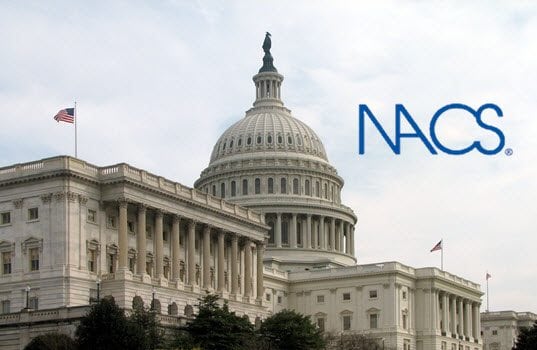By Keith Reid

Paige Anderson
In our industry, there are always new challenges and regulations arising that require us to continually adapt. With a new administration in the White House, even more dramatic shifts are surely on their way. In February, Fuel Marketer News (FMN) spoke with Paige Anderson, the National Association of Convenience Stores’ Director, Government Relations, about the organization’s legislative priorities in the coming year. NACS is the international association for convenience and fuel retailing. Next week, we get a similar perspective from PMAA.
FMN: The Trump administration represents a bit of a departure from the previous administration on many levels. What are your initial impressions?
Anderson: I think the word of the day is “unpredictable.” Regardless of party, this administration is truly unique. We have a President who is not using the traditional playbooks on how policy moves, so we can’t predict anything. It’s hard to tell where he’s going to fall on certain issues.
He’s going through the advice and consent process with his cabinet—and not just at the top. There are also several other positions below the various secretaries that have to be confirmed and people put in place. I think once that happens, we will have a better idea of the process, if not the actual policies.
FMN: He’s talked about a few issues that impact the industry relative to the environmental policies under Obama’s Environmental Protection Agency (EPA), which work their way down to the motor fuel side. How hard is it to reverse or impact those regulations?
Anderson: I know Congress has been looking at those policies based on the calendar to see if the Congressional Review Act might be in play, which is a difficult and lengthy process. That’s particularly the case with the Senate as their legislative calendar has been taken up by the confirmation process.
The President, through his executive order [on repealing two regulations for each new one passed], put a temporary halt on many of the regulations to allow time to put his team in place and really look at them. I think it will be difficult to completely overrule and stop much of it, but there may be an opportunity to go back and reopen in some cases.
One of the issues pertinent to fuel marketers that has been paused was the 2017 Renewable Volume Obligation (RVO), which was finalized last November [for the Renewable Fuel Standard (RFS)]. It’s sort of good and bad. On the one hand, we’ve been pleased that EPA got back on its schedule and we got the obligations done in time. We liked the certainty of that process.
On the other hand, some folks in the industry like the numbers and other folks thought the volumes were too high. Do we think this pause means we’re going to completely reopen those RVOs? Maybe, but that would be difficult with so many of the other regulations that are under review. You can’t do everything.
FMN: What is your perspective on the RFS under Trump?
Anderson: We know the new EPA Administrator [Scott Pruitt] has some concerns about the RFS. However, [he showed support] in testimony before the Senate, and on the campaign trail, President Trump assured—particularly Midwestern voters—that they would not be completely gutting the RFS.
The question is, if they’re not going to get rid of it, what are they going to do with it? Are they going to tinker around the edges to make the program more usable, are they going to make significant changes to the RFS or are they going to punt it to Congress?
We have a new Subcommittee Chairman, John Shimkus, who was selected to chair the panel’s Environment Subcommittee for another six-year term, and who oversees EPA and the RFS program. On the Senate side, you also have John Barrasso. Both are very strong in the fuels area and energy policy, and both have signaled that they want to take a fresh look at the RFS and see what needs to be done.
FMN: That brings up the current RFS point of obligation discussion for renewable identification numbers (RINs). Currently that is the producer, who is typically a refiner or importer, but there is a push by the refining sector to move that down to the rack.
Anderson: EPA had drafted comments to deny the petition by a small group of merchants who wanted to initiate a rulemaking to move the point of obligation down to the position holder. NACS opposes that effort, along with many other fuel retailer and marketing groups, the American Petroleum Institute (API), the Renewable Fuels Association (RFA) and Growth Energy. We all signed a letter, which has never happened in my over 20-year career. We have different viewpoints regarding the RFS program as a whole, but we all agree that moving the point of obligation would further complicate an already complicated process.
Incoming EPA Administrator Pruitt did not directly address this issue, but there is a strong voice in the administration, Carl Icahn, who wants to move the point of obligation. He’s a close advisor to the President and we just have to see how it plays out. That’s a strong concern to us.
FMN: Getting more into the store, what’s the status of menu nutrition labeling? That represents a fairly onerous requirement for retail foodservice operators. NACS has been promoting legislation—the Common Sense Nutrition Disclosure Act—that maintains but modifies the Food and Drug Administration’s (FDA’s) menu-labeling regulations so businesses may provide nutritional information to customers in a more practical format, while also removing the possibility of criminal penalties.
Anderson: Menu labeling was a part of the original Obamacare, and they’re trying to fix that program. We’re hoping to get another delay so we can finally get our legislation passed this year. We passed it in the House last year, but unfortunately we just couldn’t get it done over in the Senate before Congress closed. Now we have to start all over again with this Congress. We have that bill reintroduced and we’re trying to move it sooner rather than later.
On the compliance side, we’ve got a May 1 deadline looming over us, and we need FDA to grant us an extension so we can get the legislation passed and fixed, once and for all. We think that’s one issue this administration would be friendly and open to doing.
FMN: The Trump administration is also proposing a significant infrastructure bill. Aside from issues like promoting diesel demand, is there anything playing out at the retail level?
Anderson: The infrastructure bill comes down to money—how you pay for it. We want great roads, but we have some concerns if folks want to try and toll existing federal highways. There’s a gas tax in place to pay for that. Our folks have built their convenience stores and gas stations based on the on-ramps and off-ramps of these highways. Our fear is, if we try to put private tolling in place on existing infrastructure, it would hurt the ability for consumers to get on and off those ramps. That would be problematic for us. We’re about convenience, and that would certainly complicate matters.
FMN: And then there is the Dodd-Frank Wall Street Reform and Consumer Protection Act. It’s been a huge, controversial bill, but our industry was able to sneak in a few reforms. The Trump administration and the Republican Congress have expressed a desire to repeal it, which would include the Durbin Amendment on debit fees.
Anderson: The Durban Amendment on debit reform has been so valuable for our industry. For the first time, we were able to create some competition for our retailers in terms of how those payments are processed with the processors. We don’t want to lose ground in that area.
Unfortunately, the House Financial Services Committee is moving forward with trying to roll back Dodd-Frank as well as some different ways of reforming it. Additionally, last year when the Chairman introduced his bill, it included the repeal of those valuable reforms. Every indication points to him doing that again. Obviously the financial services industry has a lot more money than we do, but we also have a lot of retailers in every single district. We’re firing up the grass roots.
This is our number one priority at our government relations conference and fly-in in March. We’re going to be talking with well over 300 members of Congress and the Senate, so it’s going to be a big push. President Trump has indicated he has problems with Dodd-Frank, but we have not heard from him directly on the debit card reforms. It will be interesting to see how that plays out, because prior to becoming President he owned a lot of hotels, and the hotel industry accepts credit cards. His company had to pay a lot in fees.
FMN: What else is notable, legislatively, for NACS in 2017?
Anderson: There are so many different areas. Certainly we’re looking closely at healthcare. If they’re actually able to repeal Obamacare, how are they going to replace it and what is that going to look like? We’re also keeping a close eye on tax reforms and labor issues. This administration is going to be a lot friendlier to us on labor policies than the previous administration. Another issue that we’re working on is online gaming.
FMN: Could you expand on that?
Anderson: Under the Obama administration, one attorney decided to reinterpret 60 years of precedent on the Wire Act and made it so any state could allow for online gaming. What that means for us is, if a state decides to allow consumers to purchase lottery tickets online, there’s less incentive for folks to come into a convenience store.
We think lottery sales are safer, more transparent and more efficient in the store. We make sure all the rules are followed and there are no underage folks who shouldn’t be purchasing tickets. We have tremendous experience in carding and age verification.
FMN: It sounds like 2017 is going to be a busy year.
Anderson: With this administration, we’re looking at everything. We know the President is about to release his cybersecurity policy, and even his trade and international policies could have some indirect impacts on our industry. I think all of my fellow government relations folks—whether they’re with specific companies, NACS or the other associations we work closely with like SIGMA, NATSO and PMAA—are going to be earning our salaries in the next couple of years.









